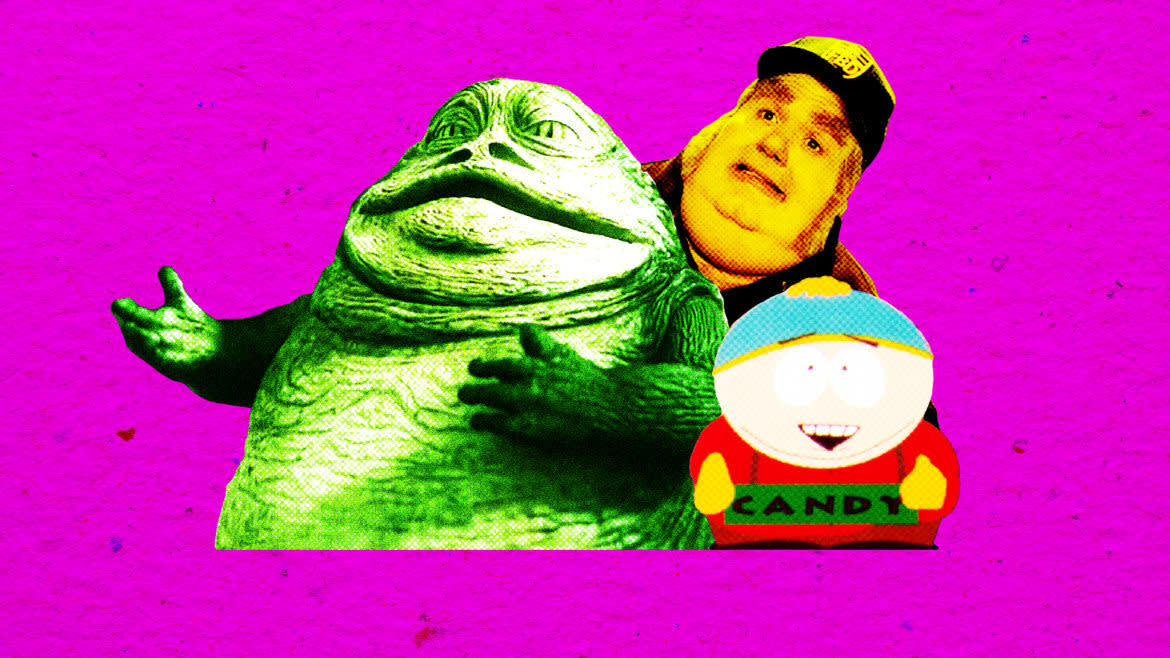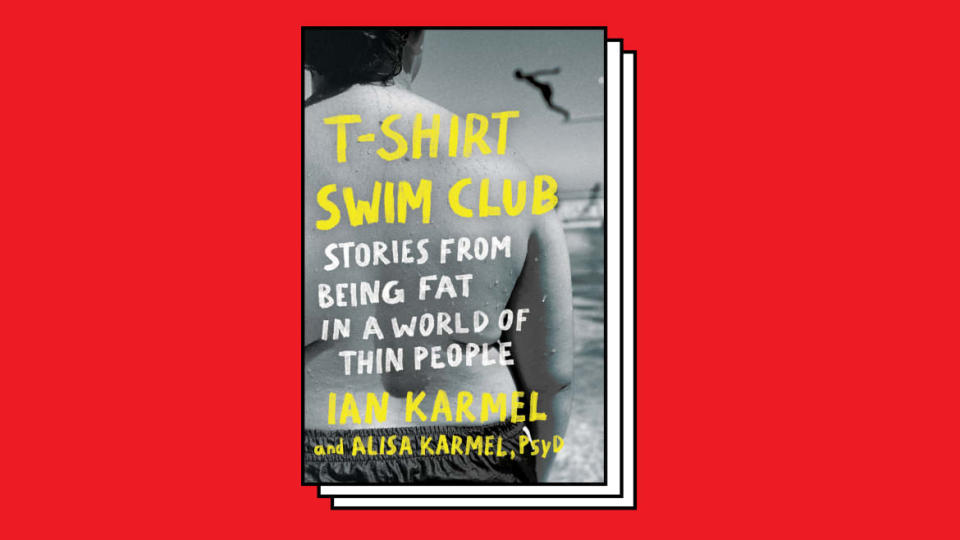How Fat Bastard, Cartman, and Jabba the Hut Conspired to Ruin My Life

The below is an excerpt from T-Shirt Swim Club: Stories from Being Fat in a World of Thin People by Ian Karmel (and Alysa Karmel, PsyD), available now.
I still remember when I first saw Fat Bastard waddle onto the screen in Austin Powers: The Spy Who Shagged Me. It was in the Regal Cinemas off 185th on opening night, June 8, 1999. A movie like Austin Powers: The Spy Who Shagged Me coming out when you’re a 14-year-old boy is like Adele releasing an album the day after you get dumped. The synchronicity is divine.
Austin Powers: International Man of Mystery, the first movie in the series, was as funny as anything I had seen before in my dumb little life. The bad guy, Dr. Evil, puts his pinky to his lip for no reason when he talks, and his voice sounds like Lorne Michaels’. In one scene, he made a comically paltry demand for “one million dollars,” and when that shit dropped in 1997 it was everywhere. Everywhere.
I remember being nestled in my seat, a bucket of buttered popcorn cradled in my lap, a slightly smaller bucket of Sprite clenched in my hand, fully prepared for a religious experience. I was young, fat, and ready to laugh. And then I saw Fat Bastard for the first time. The entire theater was already laughing. Once Fat Bastard stepped into the room, they were doubled over. He was a buckshot blast of fat jokes. His cankles were thicker than cold chili, his knees looked like topographic maps of Afghanistan, his body looked like somebody had stretched an American Girl doll outfit over a pumpkin, and any memory of a neck was as dead as the six cows who perished to make the belt screaming over his midsection.
He was a perfect weapon. I wish I could tell you I hated Fat Bastard. I’d love to say I stormed out in a cloud of self-respect. In truth, I was cackling as loud as anyone in the room. When he farted, I howled. When he said, “Get in my belly,” I was levitating. He was hilarious. Mike Myers is a genius, and he played this character with the subtlety of an atom bomb. He was like a marching band made up entirely of tubas and slide whistles. Fat Bastard is a deep-fried Twinkie of a character, and his name, from a comedy standpoint, is as lean and athletic as the character isn’t.
These were the peak days of monoculture. When the audience poured out of that screening of Austin Powers: The Spy Who Shagged Me, I knew all the kids were leaving with their cargo short pockets full of quotes that we’d be yelling at one another all year, but none of them caught on quite like “Get in my belly.” Every single lunch: “Get in my belly.” Every time a kid caught a touchdown in Madden: “Get in my belly.” Every time a fat kid did so much as breathe: “Get in my belly.” The first time I watched Fat Bastard waddle onto the screen, I couldn’t stop laughing. A star was born. It turned into a black hole. Six months later, do you know how much I would have paid for that movie to disappear forever? . . . One million dollars.

‘T-Shirt Swim Club: Stories from Being Fat in a World of Thin People’ by Ian Karmel and Alysa Karmel, PsyD
Here’s another thing that’s as true as the fact that Fat Bastard is hilarious: Kids are mean. I don’t know if it’s motivated by cruelty, I think it’s mostly motivated by terror. They’re all just terrified. Truly terrified. The kind of terrified where all you can think about is self-preservation. So they find a target, the more obvious the better, and they throw them on the rack and sacrifice them to their own insecurities.
Kids are smart, too, and resourceful. A kid can take you apart in three moves, and you won’t even know you’re dead until your decapitated head is staring up at your collapsing body. Kids are John Wick—they can kill you with a ballpoint pen. When you give them some pop culture to play with, it’s like tossing John Wick a flamethrower. There’s never been a good time to be a fat kid, but when I was growing up, there were so many flamethrowers.
One of those flamethrowers was South Park. But in addition to being one of my favorite shows, South Park was a disaster for my mental health. The Eric Cartman character, a brash fat kid, went back and forth between symbolizing everything wrong with America and just straight up being Hitler.
One of Cartman’s catchphrases was “I’m not fat, I’m big-boned.” He’d usually say it after one of the other kids said, “Shut up, fat-ass.” It was so devastating to have the fat kid respond to fat-based bullying by saying, “I’m not fat, I’m big- boned.” Like all great comedy, it worked because it was the truth. It was ripped from the headlines. I tried that “big-boned” line more times than I could count. It was one of the only tools we fat kids had to deflect bullying based on our size. Of course, nobody ever actually had big bones. We were always just fat children with standard-issue skeletons. The bullies knew it. We knew it. Trey Parker and Matt Stone, the genius creators of South Park, knew it. They dropped it into their show, and it was a disaster for kids like me.
South Park is an amazing show, and Cartman is hilarious. I think it’s funny now, and I thought it was funny then, and I didn’t just think that to help myself cope. Cartman is a cartoon, both literally and figuratively. I didn’t watch that show and think, “Well, there I am: He’s fat, I’m fat, that’s a thing we have in common and therefore we are the same.”
Other kids didn’t think that, though; they thought I was Cartman.
When the other kids think you’re Cartman, you have two options—listen to his catchphrases being screamed at you or scream those catchphrases yourself. I chose the second option— if anyone was going to make fun of me, then it was going to be me. I don’t know if I was owning it or simply doing the devil’s work for him, but either way, I was involved and that felt better than being a target. I played the role and waited patiently for a more fair and nuanced reflection of fat people to appear in popular culture.
No, I’m kidding, I just eventually learned how to do a Peter Griffin voice. Thanks, Family Guy.
Not even the remote deserts of Tatooine were safe for fat people because in Star Wars there’s a character called Jabba the Hutt. Jabba the Hutt is a murderer, a slave trader, a gangster, and yet the worst thing about him is that he’s fat. And boy, is he fat. Jabba the Hutt is inescapably fat. He’s fat in a human way even though he’s a space slug with the face of a Persian kitty. He’s sweaty, he has trouble breathing, he eats little living creatures as a snack, and he’s fat. Also, they called him Jabba. The Hutt. They could have called him “Jabba the Space Gangster” or “Brandon the Hutt” and even children watching the movie would say, “Got it, he’s a fat guy.”
I’m not looking for nuance here. I know that Star Wars is a movie franchise full of outlandish characters who work because they play on broad archetypes that are as old as time itself. This is a universe full of pastiches in prosthetics, but Jabba the Hutt is the only big bad guy without any dignity.
Again, my goal in all this is not to ruin Star Wars or South Park or Austin Powers or any other form of entertainment. I don’t currently have children, but if I do in the future, I’m going to show them Star Wars, and when I do, I’ll be upset. Not because Jabba the Hutt is an insensitive caricature, but because I’ll be showing them a sixty-year-old movie, they won’t care, and that will remind me of death. I suppose my goal is just to tell you what it was like to be watching all of this as a little fat kid, in the hope that we can do better in the future.
I was in middle school and I went on vacation to Florida with my dad, his wife, her kids, and my sister. While we were there, we went to an amusement park. When I finally made it through to the front of the line, I squeezed into my seat and I was too fat for the safety bar to close.
My gut was blocking it from clicking into place. The attendant tried to slam the bar down like he had crammed too many camping supplies into a car trunk, but all that did was call more attention to the fact that it wasn’t going to happen. As I walked away, someone yelled, “I’m not fat, I’m big-boned,” in a perfect Eric Cartman voice. Everyone laughed. The kids in line laughed, the adults in line laughed, the people working the ride laughed, the guy who tried to pull the bar down over my gut laughed loudly. So I shattered into a million pieces, and then I forced a laugh out, too. At least I had something in common with everyone else. We were all laughing. I was part of it.
I wish I hadn’t laughed. I wish I had known then that I didn’t deserve that, but what forces of the greater culture, what social norms, should have told me to think I deserved better? Fat Bastard? Fat Bastard, who said, “I eat because I’m unhappy; I’m unhappy because I eat”—a true and complicated and painful idea—and then farted?
Eventually the Fat Bastard character lost a bunch of weight and, this is so stupid, I actually remember thinking, “Oh damn, good for him.” Seconds later he collected all his loose skin and said his neck looked like a vagina. A sincerely hilarious joke that told fat people that they were a punch line no matter what. Damned if they do, damned if they diet.
Get the Daily Beast's biggest scoops and scandals delivered right to your inbox. Sign up now.
Stay informed and gain unlimited access to the Daily Beast's unmatched reporting. Subscribe now.


